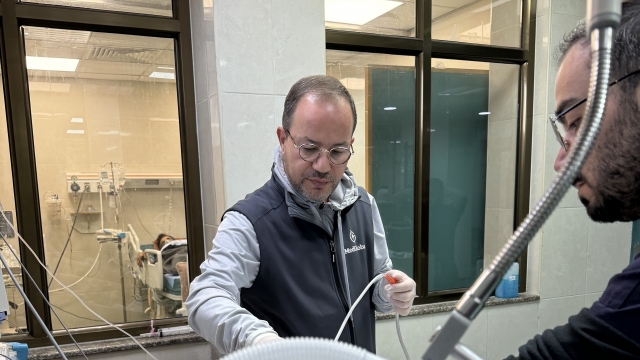Over the past 15 years, Dr. Zaher Sahloul has visited some of the worst conflict areas in the world. But Gaza, he says, is in a sad category of its own "in terms of the scale of the suffering" and the impact of the war on the population.
As the president of MedGlobal, an international nonprofit based in the Chicago area, Sahloul just returned from a two-week medical mission in southern Gaza with five other U.S.-based doctors. His delegation stayed in Rafah, near the Egyptian border, an area overwhelmed with displaced Gazans where MedGlobal set up a clinic and saw "between 700 to 800 patients every day."
Sahloul and his colleagues also worked in the ER and ICU of Al Nasser Hospital in Khan Younis, Gaza's second largest city. From the hospital window, Sahloul says he could see bombs falling from the sky.
"And then you see an influx of people coming to the hospital," Sahloul recalled, adding that during his trip such mass casualty events happened "every few hours" and disproportionately impacted children.
Even after life-saving operations, Sahloul says some patients ended up dying due to limited medical resources.
"Some of them linger, are waiting to be evacuated somewhere. And this evacuation doesn't happen. They eventually die because of complications," Sahloul said.
And even in death, there was sometimes added tragedy, he said, as medical staff was forced to send victims to the morgue without being able to alert their loved ones due to communication blackouts.
By the end of Sahloul's mission, Khan Younis had been encircled by Israeli forces — prompting "the worst exodus of people I saw in my life." That exodus, Sahloul said, included half the staff from Al Nasser hospital who panicked and had no choice but to leave patients behind.
"You see the desperation on the children's faces and the elderly; people are in the street because there's no tents for them. And it was cold and it was windy," he says.
Even in the midst of such agony, Sahloul says he found Gazans to be honorable.
"They were very dignified. They did not have the bitterness that I expected to see," the Syrian-American doctor said.
Besides providing medical aid, Sahoul says he also went to Gaza to bear witness and share with the world what he saw and what Gazans told him. "They just want this war to end so they can focus on rebuilding what has been destroyed."
SEE MORE: Here's where things stand on a potential Israel-Hamas hostage deal
Trending stories at Scrippsnews.com



